Mourinho certainly knows how two win
The Portuguese has always won the league in his second season at a club
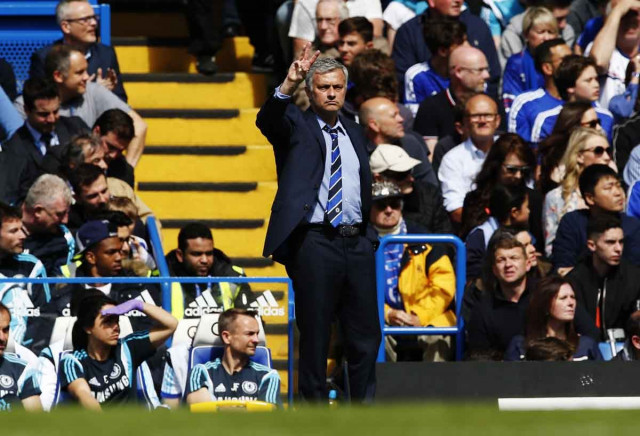
Chelsea manager Jose Mourinho gesticulates during his side's win against Crystal Palace on Sunday. Chelsea won the match 1-0 and sealed another EPL crown - the third for Mourinho. PHOTO: REUTERS
The Portuguese may be audacious, arrogant and brash in equal measure but his claim is not far from the mark, as his recent success with Chelsea on his second coming means that he has now won the league title in the second year of his club all five times — doing so at Porto, Chelsea, Inter, Real Madrid and now Chelsea again. There are few better harbingers of success in world football than Jose Mourinho.
But there is also the flip side of the coin, Mourinho’s inability to establish a dynasty, hopping clubs every few years; only able to bring about short-term success and leaving the club struggling when he leaves — the ‘post-Mourinho’ effect.
“I’m not the kind of person to be at the same club for three, four years without winning a trophy, so I’ll go and try a different thing,” the Portuguese once said.
He is Jose Mourinho and he will not change. He arrives with his definitive set of qualities and defects, dividing opinion like few others with his ‘win at all cost’ approach and defensive mentality that translates itself often to trophies but rarely into entertaining, even watchable, football.
Porto (2002-2004)
Mourinho made his name in native Portugal at Porto after brief stints with Benifica and UD Lieria, promptly turning a capable squad into the best in the country and one of the best in Europe.

PHOTO: UEFA
Twenty-seven wins, two losses, five draws and a record 86 points with an 11-point cushion over second-placed Benifica in the Premeira Liga gave the Portuguese his first-ever league win in his first season at the Estadio do Dragao.
He built on that success and further implemented his mindset — something he would go on to do in all the clubs he managed, with differing levels of acceptance — and won the title again in his second year to secure back-to-back titles.
Mourinho built the team around the players who could best implement his philosophy, and has used that same model throughout his career. “Before Mourinho arrived I was sad,” said Deco. “I was inconsolable as I had gone three years without winning the league title.”
But Mourinho brought success with him. Along with the Portuguese midfielder, the manager identified a number of key players right from the start that would form the backbone of his squad — the likes of Ricardo Carvalho, Maniche, Benni McCarthy and Paulo Ferreira among others earning his favour, along with considerable success after his time with the club.
Chelsea (2004-2007)
On his arrival at the Stamford Bridge, the Portuguese became one of the highest paid managers in football.

PHOTO: REUTERS
He brought his own backroom staff with him from Porto and spent an extravagant £70 million on players such as Tiago, Michael Essien, Didier Drogba, Mateja Kežman, along with Porto pair Ricardo Carvalho and Paulo Ferreira.
By December, the Blues were top of the Premier League table, with the likes of Essien, Drogba and Carvalho slotting directly into the team and becoming vital cogs.
That year, Chelsea lost only one match, won 29 and drew eight, finishing a comfortable 12 points ahead of Arsenal who had been termed ‘The Invincibles’ just the year before to win their first title in 50 years.
The success was built on unrivalled defensive ability, with the winners shipping only 15 goals in 38 games — the record for the fewest goals conceded in the Premier League.
And so began Mourinho’s love affair with England. Like Porto, a winning formula had already been established and Mourinho went with the ‘it ain’t broke’ approach.
The next year the title was successfully defended by Chelsea, once more built on a formidable defensive pairing of John Terry and Carvalho at the heart of the defence and Petr Cech behind them. Stamford Bridge, like all of Mourinho’s home grounds, became an impenetrable fort and out of 19 home league games in the second season, the Portuguese won 18 and drew just one against lowly Charlton.
But then it all started to go downhill from there on for the Portuguese, with Chelsea losing out to Manchester United the next year. Mourinho’s fourth season at the club started with a 3-2 win over Birmingham City to go 64 matches unbeaten at home — yet another record. However, results continued to be indifferent and just a few months into the season, Mourinho left on mutual consent after a fallout with owner Roman Abramovich; again leaving a club in turmoil behind him.
Inter Milan (2008-2010)

Inter Milan coach Jose Mourinho lifting the league trophy. PHOTO: AFP
It was then time for Mourinho to take on Italian football and Serie A giants Inter Milan soon unveiled the Portoguese as the manager to replace Roberto Mancini.
Although not many fans were impressed due to a Champions League exit at the hands of Manchester United, Mourinho helped Inter finish top of Serie A — albeit at a time when Juventus were still struggling after being relegated to Serie B due to Calciopoli.
And as was by now almost expected of the manager, Mourinho won a second title the following year but unlike his success at previous clubs Porto and Chelsea, this one was heralded as much by change as it was by stability.
Old horses Lucio and Walter Samuel had run their race according to many but Mourinho brought out the best in them, again building success around his centre back pairing. Striker Samuel Eto’o was brought in from Barcelona in a swap deal for Zlatan Ibrahimovic, while Argentine striker Diego Milito and Dutch midfielder Wesley Sneijder also came in. The trio of new recruits, propelled inter to new heights, with Sneijder playing the role of Deco and Frank Lampard at Mourinho’s previous clubs and dictating the play from midfield while Milito scored important goals throughout the season — his goals almost single-handedly awarding Inter the famed treble.
But despite the success, it was time to say goodbye. “If you don’t coach Real Madrid, then you will always have a gap in your career,” said Mourinho, and embarked on his most difficult journey till then.
Real Madrid (2010-2013)

Real Madrid players and staff toss manager Jose Mourinho into the air after winning the La Liga. PHOTO: REUTERS
There is no other way around it — Mourinho underachieved at Real and his time there was underwhelming at best.
Boasting the likes of Cristiano Ronaldo, Xabi Alonso, Karim Benzema, Luka Modric, Mesut Ozil and Angel di Maria at his disposal; Mourinho could only manage a solitary league title at his time — in his second as is his wont.
Two-time reigning champions Barcelona, managed by Pep Guardiola, proved a class above Mourinho in his first season and the Portuguese soon learned who the top dogs were when he was humiliated 5-0 in the El Clasico on November 29, 2010.
But the second year always belongs to Mourinho and even Real were no different. It would have taken something special to beat Guardiola’s monster — Barcelona’s best team in history according to Mourinho himself — and special Mourinho delivered.
Los Blancos broke their record of 168 goals in all competitions — a whopping 107 of which came in the league, another record — and claimed 32 wins in the league to become the first club to reach the 100-point milestone in the league.
But once again followed the decline after the second year’s crescendo and Chelsea finished a whopping 15 points behind league winners Barcelona. Add to that the fact that the Bernabeu faithful had never truly warmed up to Mourinho’s defensive approach and it was a match destined to end bitterly.
Mourinho was sacked soon after and returned to the place he loved — the Stamford Bridge and its familiar blue.
Chelsea (2013-present day)

Jose Mourinho stops the ball during the match against Crystal Palace on Sunday. PHOTO: REUTERS
It was the prospect of building a second great team at Chelsea that had Mourinho plotting his return to Stamford Bridge. But he wasn’t going to rebuild from scratch; he was going to once again make it fit to his tried and tested framework.

Adored by Chelsea fans and voted the club’s Player of the Year, Juan Mata was the darling of the Bridge when the Portuguese arrived. But Mourinho apparently didn’t see it that way. Six months into Mourinho’s stint, Mata was sold in January 2014 for £37.1 million.
And then Mourinho made the ‘brave’ move of bringing back former Chelsea reject Nemanja Matic from Benfica. It was a move that paid immediate dividends as Matic provided security in the middle of the park and shielded the defence, becoming one of the best defensive midfielders in the country.
Chelsea finished third that year, the same as they had the previous season, with Mourinho often bemoaning the lack of quality in his trio of strikers — Eto’o, Fernando Torres and Demba Ba.
The Blues acted quickly on his demands and brought in Atletico Madrid striker Diego Costa. Along with Costa came Cesc Fabregas and the return of loanee Thibaut Courtois. All three became important fixtures in the side and were the main catalysts of Chelsea’s early surge to the top — a position they never relinquished throughout the season.
When Costa and Fabregas tired during the latter part of the season, it was Eden Hazard who stepped up to the mantle.
However, once again Chelsea’s success was built around a solid defence, with the Blues conceding the least amount of goals in the league so far as John Terry, Gary Cahill, Branislav Ivanovic and Cesar Azpilicueta have been ever present at the back, protected by Courtois behind them and Matic in front of them.
This has once again led to the all-too-familiar criticism of boring football under Mourinho but the Portuguese has never been one to care about popularity — all that matters in Mourinho’s world are trophies and tangible success, and he has enough of it already to last a lifetime.
Published in The Express Tribune, May 5th, 2015.
Like Sports on Facebook, follow @ETribuneSports on Twitter to stay informed and join in the conversation.

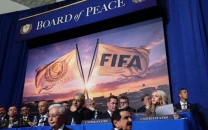
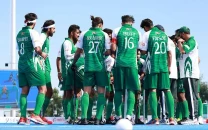

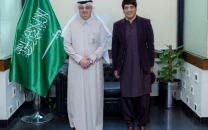

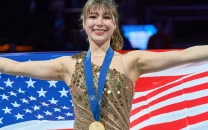












COMMENTS
Comments are moderated and generally will be posted if they are on-topic and not abusive.
For more information, please see our Comments FAQ